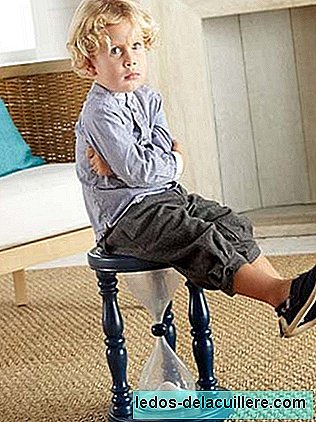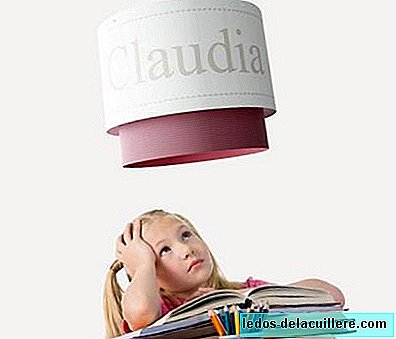
A few days ago Lola showed us a stool with an hourglass (the same in the photo) whose goal is to mark the time that a child should be sitting on, in this case five minutes.
The invention is horrible, first because it shows that any matter, even educational, can give an idea to an designer, to invent the optimal element to carry it out. Second, leaving marketing aside, because as soon as I saw it and saw the boy sitting on it I did an abstraction exercise to imagine myself as a child, Armandito, being seated on that stool and it gave me a very bad feeling.
At that time the stool, which already seemed ugly without knowing what its purpose, seemed to me even uglier, even more hateful, even more “torture chair” and I imagined myself running around the house, braking with respect, or rather with fear, as I passed by the stool, watching him closely trying to prevent him from approaching me, as if he would suddenly come alive to catch me in a Eternal fall from the sand.
So disrespectful was the invention that here you have this entry in which I tell you my vision about the thinking chair or "time out."
The thinking chair or the thinking corner
The thinking chair became famous, if I'm not mistaken, thanks to Jo Frost and his role as Supernanny (It probably already existed a long time ago, but I met her thanks to her). It is a technique that I have never liked and that I still don't like for several reasons.
It is better than the punishments of yesteryear, where some physical corrective could fall and where the severity of the punishment was directly proportional to the mood of the mother or father. If you had a dog day you could fall a tremendous punishment, if you had a good day, the punishment was less.
However, as we explained in their day, the punishments, bigger or smaller, are punishments, and by definition they try to stop a child from doing something because the consequence is punishment, that is, learn that if he does what he has done again he will suffer the consequence we have invented (Do not watch TV, do not go to the park, sit down five minutes to think, ...).
This makes the consequence of an act a higher or lower price to pay, but not the actual consequence of its act. If I drop a glass of water and my mother gets pissed off and punishes me without dessert, I learn that "glass of water on the ground = no dessert." It would be much more educational for my mother to give me a cloth or cloth and say "I see water on the floor, could you clean it?", Basically because I would learn that "glass of water on the floor = water on the floor." In this sense, next time I will not want to drop it because I will not want to have to clean it and, if it falls out again, I will know what I have to do.
The other way, If one day I do not like the dessert, there will be no reason to avoid the fall of a glass full of water to the ground, although if my mother knows that I don't like dessert, she will invent a new punishment and I will have to learn that “glass of water on the ground” can have a different consequence if I don't like the dessert of that day, entering into a learning that scratches absurd.
In this sense, the corner of thinking is a solution to avoid having to invent punishments. He drops a glass, in the corner of thinking, hits his brother, in the corner of thinking, breaks a vase, in the corner of thinking. The child ends up knowing that Anything that makes parents don't like it results in the thinking corner.
It is very easy for parents, but so a child does not learn the real consequences of his actions and thus does not learn values. A child will not want to be a good person, will not want to behave correctly because it is what is right, but He will do it to avoid the corner of thinking.
This is dangerous, because growing up avoiding involves learning to lie: "If mom doesn't know that I have done something, I will avoid thinking." If, on the other hand, a child behaves well because he wants to do the right thing, no matter whether Mom is in front of him or not, he will own and master his actions.
Thinking is a good thing, don't turn it into something negative, please
Another reason why the thinking chair or thinking corner is something negative is that to the word think, one of the most wonderful we have in the Spanish dictionary, we add a negative connotation. Thinking becomes boring, something obligatory: “you have behaved badly, sit down to think,” and today, when we need people who are able to think and innovate, the less desire children have to do it, if they they associate with that time that they spent on the stool of thinking with an hourglass.
So that it is not thinking, that it is boring
In the school of my son they made this reflection on the verb to think and they changed the chair of thinking for the chair of boredom. It is better to "bore" than "think", although in essence it is the same. Also, getting bored doesn't have to be a bad thing, boredom is sometimes the funniest games and creativity, because when you get bored you have to think about what to do next, but I say, If you have to have a name, I prefer the chair of boredom.
Why five minutes?
The hourglass of the stool that we see in the image gives for five minutes, but I wonder: Why five minutes? Why not two? And put to change the child's behavior, why not ten minutes? Won't ten minutes be twice as effective?
Well, if we want a child to think and reconsider, just explain things: "I do not like what you have done because this happened and when this happens another ...". If you understand it, perfect, if you do not internalize it, a sign that you are still small to assume that norm, that value, or that you need more explanations, in successive moments, to make it your own (and in cases like that, obviously, five minutes sitting in a chair will not help you understand anything).
I trust children, I trust their ability to understand what is right and what is wrong and that is why punishing them for five minutes to think seems disrespectful to us, because we are not trusting their ability, as people they are, to understand our words. , to understand what is right and what is wrong and we cede that power while out.
And nothing can be done? There are moments that ...
There are always times when you are looking for something, a tool, something that helps you stop an action that you are not liking at all, that something that helps you say enough. Piaget said in his day that one of the most appropriate punishment for children was the one they controlled themselves (He didn't say it with these words, but more or less).
I have only used it once in my six years as a father and that time it was the only one that "punished" one of my children. I accompanied him to his room and said "stay here until you are able to be with others without doing this." Obviously I added more explanations, but at that moment when the dialogue was failing and it was necessary to stop the action now, I opted for the time outside, leaving him to decide when the “punishment” ended (in a circle because in the end the punishment is almost a no punishment).
As he was he couldn't be with us, he was hurting the little one and annoying the elders, so I simply told him that we preferred it to be somewhere else, because it bothered us all, but that if he was able to be with others without doing so (without disturbing him) he could come with us again. There is no five minutes or a certain time, he is not punished in his room, he is simply told that acting in an X way is annoying and that if he is able to respect others, he can be without problems with others. The child decides when to leave the room because he can already be without disturbing the rest... the child controls the "punishment."
I have not repeated the method because I do not like it too much (and that this would have been the punishment that I would have wanted for me as a child) and because the dialogue has been working to date. Edward Bulwer-Lytton said that "The pen is stronger than the sword", the word being the pen, the thought, the dialogue and the sword the force, forcing situations, the "for the bad", and I believe him. I believe him because as I say, with the dialogue, with the word, you can achieve the same, or more. It is more tedious, it is more difficult, it is slower and sometimes exasperating, but in the end it leaves a better taste, it is a smarter process and there are no humiliations involved, but common sense, negotiation, affection, words and understanding, Final understanding.







![[Christmas Special] Advertising bombing, target children](https://img.ledos-delacuillere.com/img/bebesy3-2019/bombardeo-publicitario-objetivo-los-ni-os.jpg)




